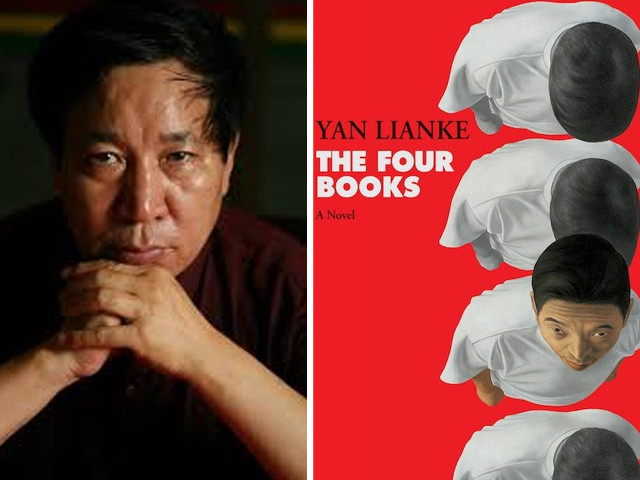Chinese literature, one of the most overlooked in the world, is also one of the richest. Since the beginning of this century alone, China has produced two Nobel Laureates in Literature: Gao Xingjian (2000) and Mo Yan (2012), and yet it remains mainly unknown to a larger reading population worldwide. And while many Chinese novelists are lauded internationally, their plight is such that, at home, they constantly have to grapple with state sponsored censors and almost despotic regulations.
In a melancholy article for the New York Times that was published in 2012, the internationally celebrated Chinese writer, Yan Lianke, lamented how his novel, The Four Books, which took him more than 20 years to plan and write, was banned in mainland China. It was rejected by more than 20 publishers on the simple premise that they could not risk publishing his controversial work for the fear of being shut down. The fate of his remarkable book in China is yet to be decided, however, finally, it is available in English to Anglophone readers worldwide in Carlos Roja’s vivid and impeccable translation.
The novel, written in Lianke’s signature satirical style, revels in the empty pockets of China’s official history. It takes place during a time (1958-1962) which the state has constantly tried to eliminate from its people’s memory. Bold in its ambition and vast in its scope, the novel confronts the Chinese people’s harrowing experiences during the Great Leap Forward and the tormenting famines that followed. During this time, with Mao’s crash industrialisation scheme as its backdrop, the tapestry of Chinese socio-political progress is infested with collapsing agriculture industry and mass destruction in the countryside as a result of which more than 40,000 people are starved to death and/or killed.
A major part of the novel takes place in the North of China, near the Yellow River, where a ‘re-education’ camp is set up. A hoard of intellectuals, scholars, engineers, doctors, musicians, theologians etc. are brought to the camp for their re-education and for riding them off their ‘rightist’ beliefs. The camp members are named after their professions only, and more peculiarly, the camp leader is a strange juvenile who is known as the ‘Child’. The Child, despite his tender age, is a stringent and harsh leader. He runs the camp based on his rules, his personal ten commandments. The members, rather the prisoners of the camp, are threatened to death in case they flee. Their books and other intellectual property are burnt to provide ‘warmth’ to the Child.
At once austere and desolate, stark and profound, this novel is by no means an easy read. Lianke’s luscious prose is as ever readable but the dark and potent subject matter make for a haunting yet deeply affecting reading experience. It opens a window on a reclusive and repressive kingdom and an obscure chapter in its sinister and mysterious history. Lianke, with an uncanny ardour explores, as he always does, the past decades of Chinese communist rule. He’s infatuated not with the mere exploration of China’s appalling history but he blatantly enjoys dissecting and deriding it as well.
This voluminous but inventive novel, with its humour, sympathy and lampoon, is just one part of Lianke’s provocative oeuvre. Yan Lianke is an extremely fascinating writer in the sense that his work is sparkly with an effusive allegiance to his peasant origins and to his poverty-stricken hometown, and at the same time it burns with a passion, a ferocious anger over the political abuses of the regime. His prose is delicious and should be savoured slowly. Only through exploring its intricacy, nuance and detail can the reader come to value such an elaborate and frank testimony to the human courage.
In recounting the experiences of the intellectuals and the scholars in the re-education district, Yan Lianke displays a prudent wealth of generosity and compassion, a capacity to see both the misfortune and the humour of their situations; and this eerie quality burnishes the novel with an incandescent and warm smoulder of redemption.
The Four Books is unlike any of Lianke’s previous works. It does not possess the incensed, visionary power of Dream of the Ding Village or the vehement phantasmagoria of Lenin’s Kisses. In this book Lianke shows how a few forgotten and even banal lives can reach the heights and depths of suffering and emancipation. The result is a rich and multi-layered novel, a novel whose narrative prowess is rivalled only by its grandness of vision.
Yan Lianke might not win his country another Nobel Prize, but as a timely chronicler of his country’s past and present and as an intelligent and sensitive analyst of its political conditions, he ought to win himself and Chinese literature a whole, many more readers.
Yan Lianke’s The Four Books brings Chinese history to its knees
The Four Books, which took him more than 20 years to plan and write, was banned in mainland China.



COMMENTS
Comments are moderated and generally will be posted if they are on-topic and not abusive.
For more information, please see our Comments FAQ